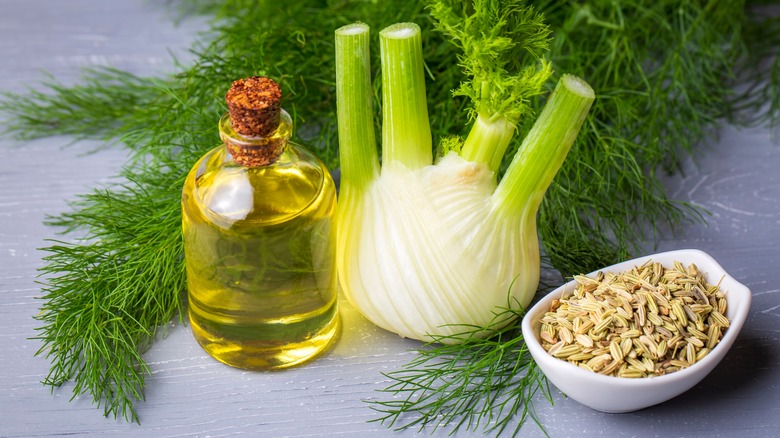What Impact Does Fennel Oil Have On Your Kidney Health?
Day in and day out, our bodies are working hard on our behalf. Much of the hard work is done surreptitiously, allowing us to sit back and relax without having to worry about the complex inner workings of our physiology. However, bodies need a little help from time to time, and that's where herbs come in. From widely used medical systems like Traditional Chinese Medicine and Ayurveda to the healing rituals of indigenous cultures, herbs have played a fundamental role in the maintenance of human health for millennia (per Mount Sinai).
Globally, 80% of people still use herbal medicine as part of their primary healthcare. As public dissatisfaction with the healthcare system in the United states has risen over the last 20 years, we have seen a spike in the use of medicinal herbs across the nation (per Mount Sinai). Of course, just because herbs are natural doesn't mean they all are safe for every person to use. Some herbs may have contraindications that make them dangerous if used in conjunction with certain medical conditions.
With its wide range of health benefits, fennel oil — a carrier oil infused with the medicinal properties of the fennel plant — has seen a spike in popularity as of late. What impact does fennel oil have on your kidney health? Let's take a closer look.
The kidneys and the benefits fennel oil
The National Kidney Foundation explains that our kidneys' main function is to remove waste and excess fluid from the body, but they also regulate our body's salt, potassium, and acid content. Additionally, they produce the hormones that regulate blood pressure and stimulate the production of red blood cells. Tasked with such a critical role in the proper functioning of our bodies, it's essential that we keep our kidneys happy and healthy. Now, some researchers have begun looking at fennel's role in that.
In a 2017 study published in the Asian Journal of Pharmaceutical and Clinical Research, data showed that female rats treated with fennel seeds exhibited a reduction in the formation of kidney stones in comparison to a control group. From their findings, researchers concluded that fennel seed was effective in both the prevention and the treatment of kidney stones. Furthermore, a 2015 study published in Evidence-Based Complementary and Alternative Medicine reported that participants inhaling the scent of fennel oil experienced temporary improvement in kidney function.
The kidneys and contraindications of fennel oil
While the two studies previously discussed suggested that fennel could be beneficial for kidney health, other reports have contradicting evidence. In a 2017 study published in the Journal of Pharmaceutical, Chemical and Biological Sciences, it was found that while male rats given fennel seed orally for 10 and 20 days showed little difference in kidney weight and function, rats given fennel for 30 days experienced degeneration and necrosis of the kidney cells. This led researchers to conclude that the variation in results might be related to the dose of fennel administered, as well as the amount of time the rats were subjected to treatment.
In an article examining how diet impacts people with kidney disease, St. Joseph's Healthcare Hamilton noted that as kidney function declines, the amount of phosphorus in the blood might increase. This can cause symptoms like itchy skin, calcium loss, and painful, bony deposits in the heart, skin, joints and blood vessels. For that reason, some people with kidney disease may need to limit the amount of phosphorus in their diets. Nutrition Data reports that one bulb of fennel contains 117 milligrams of phosphorus or 12% of the recommended daily value of phosphorus for a healthy person.
If you're thinking of trying fennel oil for its many benefits, check with your doctor first to make sure it's a good fit for you.



